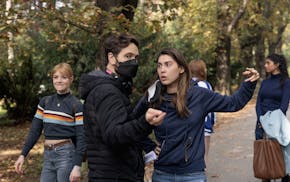One day, along the bank of a river, a woman noticed a child floating swiftly downstream. She jumped in and saved the child from drowning. The woman's neighbors arrived to help. They spotted more children struggling in the river. So they organized their community, standing guard on the riverbank with blankets and food. Just as they feared, children continued to float down the river. Then one of the rescuers began walking upstream, away from her post on the riverbank. The others cried out: "Don't leave -- where are you going?" She responded: "I'm going to try to stop these children from falling into the river in the first place."
Terrie Rose, an early childhood expert from Edina, uses this story to illustrate the need for us to invest more time, energy and money in early childhood efforts here in Minnesota. A growing amount of research shows that investing in these programs can lead to a stronger workforce, savings in remedial education and reductions in crime.
I am proud to share that Edina is leading the way. Edina Partnering for Early Education (EPFEE), co-chaired by Cheryl Gunness and Stephanie Zahrbock, has pulled together parents, the business community, local churches, the Edina Public Schools and private schools in the area. The focus: highlighting the crucial importance of high-quality education in the first five years of life, when approximately 80 percent of brain development takes place. The goal: getting our kids ready for kindergarten.
A study by the Minnesota Department of Education found that nearly 50 percent of children entering kindergarten in the state were not prepared to learn. What can we do? The EPFEE is now working to ensure that early education experiences and curriculum, both public and private, are seamlessly integrated with the K-12 system. An Edina Kindergarten Readiness Summit is in the works that will bring together pre-schools and caregivers with our elementary schools and teachers to ensure that the handoff from preschool to kindergarten is smooth.
At the state level, we also need to support and learn from the work of the Minnesota Early Learning Foundation (MELF) and the University of Minnesota. MELF, led by Art Rolnick, senior vice president at the Minneapolis Federal Reserve, has launched pilot projects in urban districts that include early education scholarships for low-income families. The University of Minnesota is providing analysis to determine which pre-school programs are better at preparing kids for school.
State policymakers need to encourage more of these efforts at the local level. The public sector cannot, and should not, do this alone. Indeed, 80 percent of the money spent in this area is private. Working together, we can make sure that our children stay out of the river and are ready for kindergarten.
State Sen. Geoff Michel, R-Edina, represents Edina and West Bloomington and is co-chair of the Senate Early Education Subcommittee.
Rollover wreck of vehicle exiting I-94 in Minneapolis leaves 1 woman dead, 4 injured

Perfection comes with a reward for 3 teams in baseball Metro Top 10

Shakopee Mdewakanton tribe applies to put 815 acres in southwest metro into trust

Lakeville teachers vote to authorize strike
